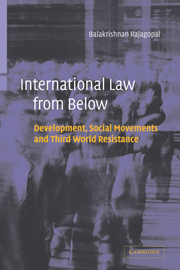Book contents
- Frontmatter
- Contents
- Abbreviations
- Preface and Acknowledgments
- Introduction
- PART I International law, development, and Third World resistance
- PART II International law, Third World resistance, and the institutionalization of development: the invention of the apparatus
- PART III Decolonizing resistance: human rights and the challenge of social movements
- PART IV Epilogue
- References
- Index
PART II - International law, Third World resistance, and the institutionalization of development: the invention of the apparatus
Published online by Cambridge University Press: 09 July 2009
- Frontmatter
- Contents
- Abbreviations
- Preface and Acknowledgments
- Introduction
- PART I International law, development, and Third World resistance
- PART II International law, Third World resistance, and the institutionalization of development: the invention of the apparatus
- PART III Decolonizing resistance: human rights and the challenge of social movements
- PART IV Epilogue
- References
- Index
Summary
The Commission must be so constituted that it can constantly bear in mind three points of view: international interests, since in modern civilization what affects one region of the world has repercussions in every other portion; national interests, since the rights and dignity of the Mandatory Power or the Mandatory Dominion are intimately concerned; native interest, since the promotion of the welfare of the Mandated Territories is the primary object.
Hon. Ormsby-Gore, The League of Nations Starts, an Outline by its Organizers (London, 1920), 116.The ‘native interest’ was truly born with the invention of the Mandate system in the League of Nations. Even though the ‘humanitarian’ idea that the welfare of the natives in various colonies must be promoted had been animating the imperial European conquest of Asia and Africa throughout the nineteenth century, international law had not truly been prepared for that task until the League. Indeed, the natives were seen as lazy, lacking in dynamism and entrepreneurship and were considered to lack the character necessary for capitalism, including by many social scientists in the nineteenth century. This was important, since (as mentioned in the introductory chapter) the route to civilization now lay in the transition of traditional economies into modern ones. An effort to bring welfare and development to the natives could then be justified more easily on the more culturally neutral terms of the ‘doux commerce’ thesis, rather than the more imperial, theological imperative to bring the true faith to the infidels.
- Type
- Chapter
- Information
- International Law from BelowDevelopment, Social Movements and Third World Resistance, pp. 37 - 49Publisher: Cambridge University PressPrint publication year: 2003

